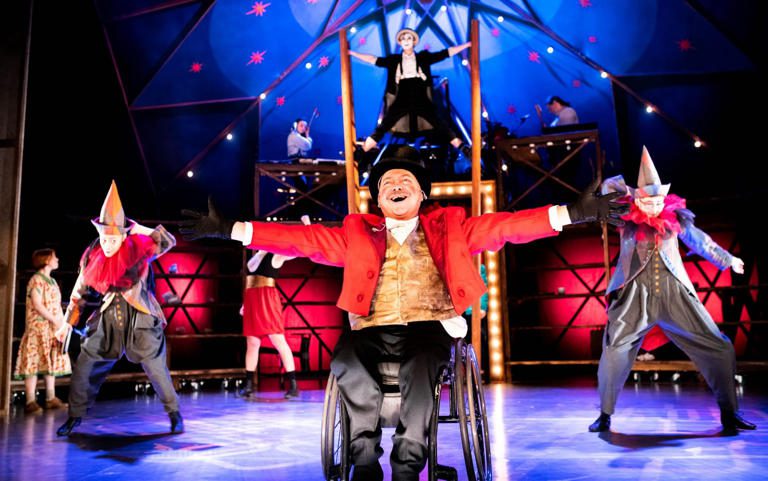Waldo’s Circus of Magic and Terror, a marriage of theatre and circus, is set inside a Big Top somewhere in Germany, a place where we watch the actors rehearsing and performing as the Nazis come to power in 1933. It is based on the facts that circuses have always been home to ethnic minority and disabled people, and that circus performers were used to entertain the crowds at Nazi rallies. Writer Hattie Naylor put these facts together to construct a story, with co-writer Jamie Beddard, to tell of the pressures on performers under the new regime when the magic of the title gives way to its terror.
Waldo is played with assurance of authority by Gary Robson as a red jacketed ringmaster in a wheelchair who claims his disability is the result of a war wound, fighting for the fatherland in WW1. His despised son, played with pathos and admirable acrobatic skill by Tilly Lee-Kronick, goes off to join the brownshirts to emphasise the moral see-sawing of the period. ‘You will wish you had been kinder’, he sings.
This lively new production is the work of Extraordinary Bodies, a troupe of diverse, disabled and non-disabled actors in fabulous costumes who maintain a fast pace with sketches and turns such as the remarkable athletic abilities on the trapeze of Jonny Leitch who only has the full use of his upper body.
Partly this musical is the old fashioned story of a young man who leaves his prosperous family to join the circus, but the family firm of Gerhard, played by Lawrence Swaddle, is I.G.Farben who we know produced the poison gas used in the holocaust. Throughout the performance, a sulphurous smell of burning pervades the space.
The romantic interest is provided by Garhard’s relationship with Krista, a person of short stature played by Abbie Purvis who is the star of Waldo’s and of this show, singing such songs as ‘My special gift’ and ‘Freakology.’ Her songs and the voice of Jack Reitman who plays Joseph Benowitz stand out.
Max Marchwicz zips around the stage in their electric wheelchair giving the dialogue in British Sign Language. Screens beside the stage show the dialogue in surtitles except when deaf characters are speaking in sign which the screen projects as a courtesy for hearing people. This technique is used to most devastating effect when Raphaella Julien performs ‘The Song of the Disappeared’ about the disabled and others who were taken in the first years of Nazi rule.
The moral focus of the play moves from the assertion by Waldo that they are ‘artistes,’ and have nothing to do with politics, to a situation where he must ‘cleanse’ the troupe so they can perform at a Nazi rally. It is classic musical technique to raise the stakes in the second act, and the stakes could not be higher than complete annihilation. This is great theatre: we know exactly where it is going, but have no idea how it will be resolved. It is not afraid to touch on difficult issues such as hereditary versus acquired disability and people with hereditary disability deciding to have children, but this piece is much more about feeling than thinking. It calls to mind other musicals referencing the same period: The Sound of Music, Cabaret and the Hollywood cult film Freaks. The production is not without its problems, tightening throughout with a later entrance to scenes and an earlier exit would improve the flow; the music can be samey (though expertly performed).
Theatre in the late 20th century was rightly criticised for being narrow and shallow in its range. Any night of the week you could see a play about white middle-class people’s marital problems. The stage was set for something different and this is it: genuinely inclusive theatre drawing from different traditions and tackling a profound subject with agility and skill. You will boast in the future that you saw it on its first tour.

